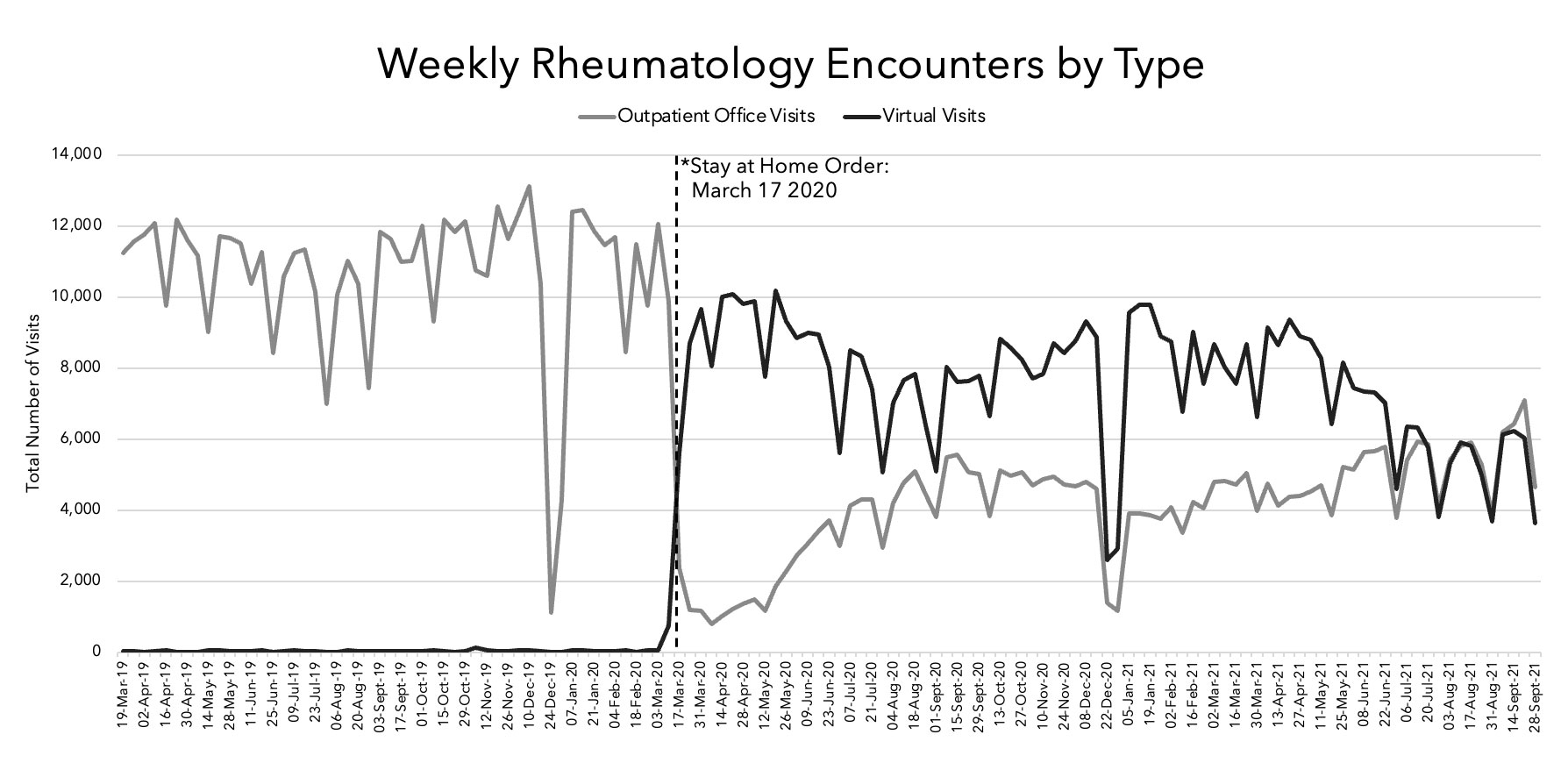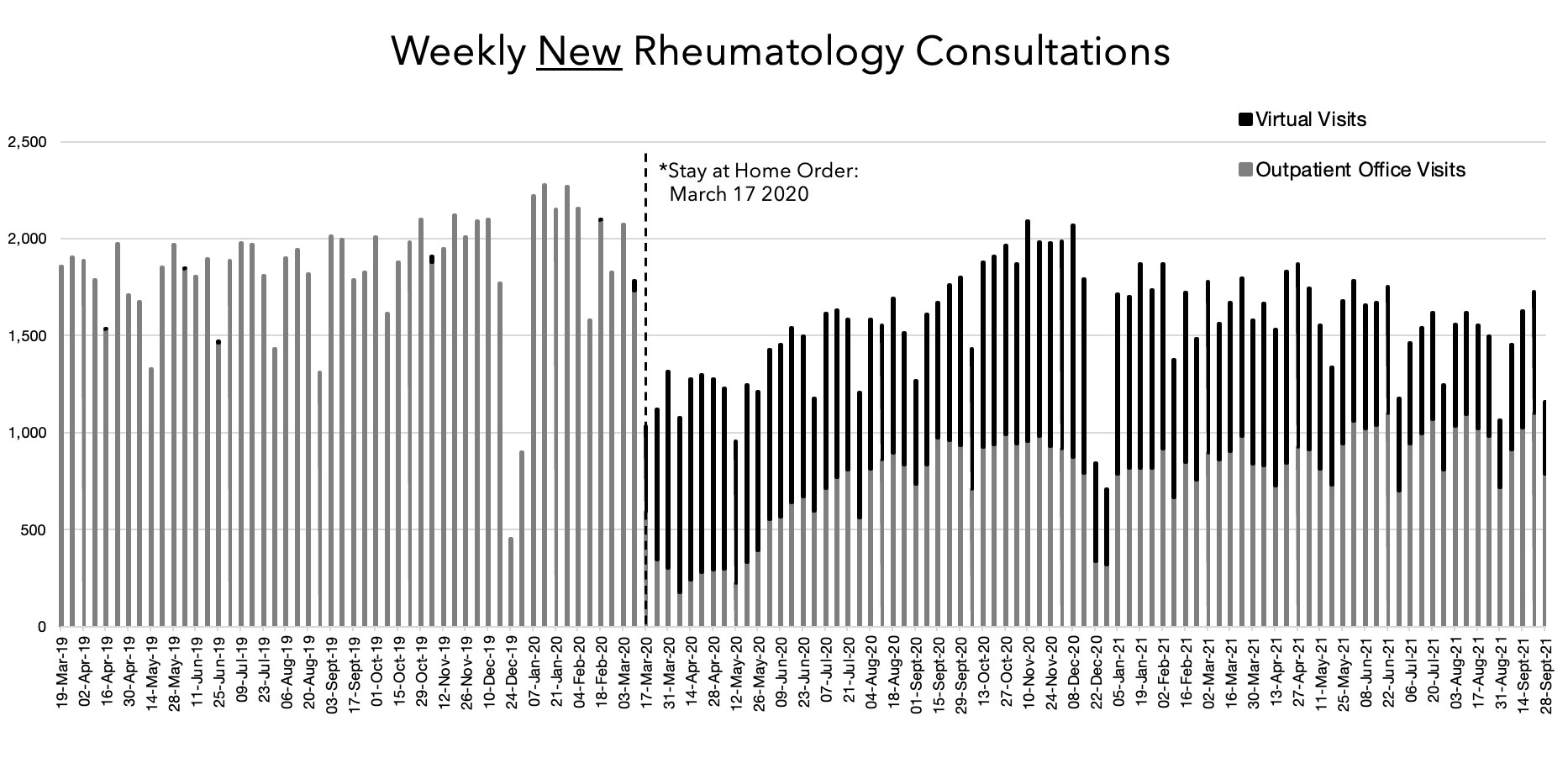Session Information
Date: Saturday, November 12, 2022
Title: Health Services Research Poster I: Lupus, RA, Spondyloarthritis and More
Session Type: Poster Session A
Session Time: 1:00PM-3:00PM
Background/Purpose: We sought to describe changes in service delivery and access to rheumatologists in terms of changes in weekly total office visit volumes, telemedicine visits, and new consultations pre- and during-pandemic periods.
Methods: We conducted a population-based study in Ontario, Canada, where all residents are covered by a single-payer healthcare system. Patient visits with all rheumatologists in Ontario were ascertained using billing claims data (from January 2017 to October 4, 2021). Contacts with rheumatologists were separately defined by the type of patient encounter (including office visits, telemedicine visits, and new patient consultations). Changes in the total weekly volume of visits and monthly rates after COVID-19 public health measures were imposed were compared to expected baseline rates determined before pandemic onset (March 17, 2020, when a province-wide stay-at-home order was instituted in Ontario).
Results: In the 1 year prior to the pandemic, there were 289,202 unique patients (of which 99,641 were new consults) seen by 239 rheumatologists. In the 1 year following the pandemic onset, there were 276,686 patients (of which 88,777 were new consults) seen by 247 rheumatologists. There was an immediate 76% decrease in outpatient office visits at the onset of the pandemic and a rapid rise in telemedicine visits, Figure 1. By fall of 2021, 50% of patient encounters were still telemedicine visits. For new patient consultations, there was an immediate 50% decrease in total visits at the onset of the pandemic (cancelled/postponed), with 55% diverted to telemedicine visits in the first year of the pandemic vs. 38% by the fall of 2021, Figure 2. During the 12 months after pandemic restrictions were imposed, new rheumatology consultations decreased overall with monthly rates as low as 0.61 (95% CI 0.59, 0.62) of expected rates, with rate ratios less pronounced by fall 2021 (although rates of new consultations were already declining in the 3 years prior to the pandemic).
Conclusion: Rheumatology care delivery has shifted as a result of the pandemic, with telemedicine sharply increasing early in the pandemic and persisting over time. The pandemic also negatively impacted access to rheumatology services resulting in fewer new patient consultations. The longer-term impacts of these changes to rheumatology care delivery on quality of care, and delayed access to care warrants further research.
To cite this abstract in AMA style:
Kwok T, Kuriya B, King L, Eder L, Thorne C, Li Z, stukel t, fu l, Kopp a, Widdifield J. Impact of the COVID-19 Pandemic on Rheumatology Services in a Universal Healthcare Setting in Canada: A Population-based Study [abstract]. Arthritis Rheumatol. 2022; 74 (suppl 9). https://acrabstracts.org/abstract/impact-of-the-covid-19-pandemic-on-rheumatology-services-in-a-universal-healthcare-setting-in-canada-a-population-based-study/. Accessed .« Back to ACR Convergence 2022
ACR Meeting Abstracts - https://acrabstracts.org/abstract/impact-of-the-covid-19-pandemic-on-rheumatology-services-in-a-universal-healthcare-setting-in-canada-a-population-based-study/


